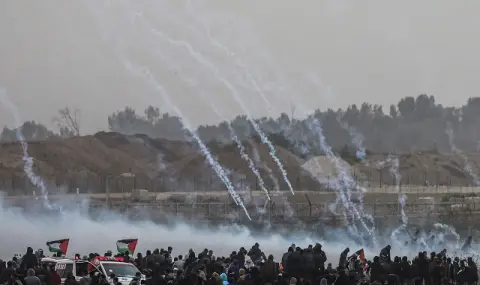"Where shall we go? What should we do? We desperately want a cease-fire and a truce," say residents of Rafah. However, a truce is not imminent. What's next for the people of Gaza?
Spontaneous celebrations in the streets of Gaza after Hamas announced it had accepted a ceasefire proposal did not last long. Shortly after, Israeli Prime Minister Benjamin Netanyahu said the deal did not meet Israel's expectations and the Rafah operation would go ahead as planned. Although Israeli delegates were sent to negotiate, the offensive in parts of Rafah began, and hundreds of thousands of Palestinian civilians were once again forced to evacuate.
The Israeli military now also controls the Palestinian side of the Rafah crossing to Egypt. It is the only way for Palestinians to leave the territory and is one of the main entry points for aid into Gaza. It remains closed, as does the Kerem Shalom crossing, where four Israeli soldiers were killed in a Hamas attack on Sunday.
"Where shall we go? What should we do?”
The dynamic development of events confused many in Rafah. Gada Rafiq, 30, and her family still drove to Khan Younis, although they still hope the Israeli attack on Rafah will be called off. "The thought that I will return to a tent without water and with minimal options is terrifying," Rafik told DV on the phone. "Where shall we go? What should we do? We are desperate for a ceasefire and a truce. I pray to God for a quick ceasefire agreement and for the army not to enter Rafah.
For months, the threat of an impending Israeli ground offensive has hung over Rafah, which is home to much of the northern Gaza Strip. Soon after the Israeli army announced that 100,000 civilians were to be evacuated from the eastern part of the city, people began to leave, loading their belongings into cars or onto donkey carts. Others just walked with a few bags in their hands. Thousands were on the move again, exhausted by months of bombing and displacement.
Rafiq is one of them. On Monday morning, she wakes up to her cell phone ringing. "It was an automatic message from the Israeli army ordering us to evacuate from the eastern part of Rafah. We live in Al Janina neighborhood, one of the areas designated for evacuation,'' she says.
"There are no places left for people to live"
The young Palestinian woman is from the northern part of the Gaza Strip and, like many others, has been displaced several times in the past seven months after the Israeli army ordered people to leave the area. "First we were in the Jabalia refugee camp, then we went to the Nuseirat refugee camp, then Deir al-Balah, then Rafah," says Rafiq, who has been through it all with her four siblings and parents.
23-year-old lawyer Mohammad al-Najjar told German media outlet ZDF that no one knew where to go. "The Gaza Strip is so destroyed that there are no places left for people to live." According to the young man, a big problem is that no one in Gaza trusts the Israeli army. That's why people don't know if they should even go to the "extended humanitarian zone", where Israel called them to evacuate.
Abdelrahman Abu Jazar also doesn't believe there will be a place for his family where the Israeli army tells them to go. According to him, these areas are overpopulated. "There is not enough space for more tents, there are no schools to put us in,” he told ZDF. But he goes anyway - because he has nowhere else to go.
"The scenes are painful”
More than one million people have sought refuge in Gaza's southernmost city. It's unclear what will happen to those who can't leave - the elderly, the sick and those who don't want to leave because they don't think it's safe enough.
54-year-old Fadel Kandel is from Rafah and has decided to stay in his home, even though his family lives near one of the evacuation zones. "Today is scary in every sense of the word. Despite the earlier threats of a military operation in Rafah, since the morning the atmosphere is different," Kandil told DV by phone. "When evacuation leaflets were dropped in Rafah, the scenes of people carrying bare necessities and leaving their homes were painful," he said.
The father of seven children explains to DV that he simply did not know where to go with his large family. He hopes that a ceasefire agreement will be reached soon, but the ongoing uncertainty in the talks is taking a toll. "The encouraging news about the ceasefire has eased my fear a bit, but I'm not sure if it will work. I'm not an optimist, but I hope it turns out I'm wrong," adds Kandel.
